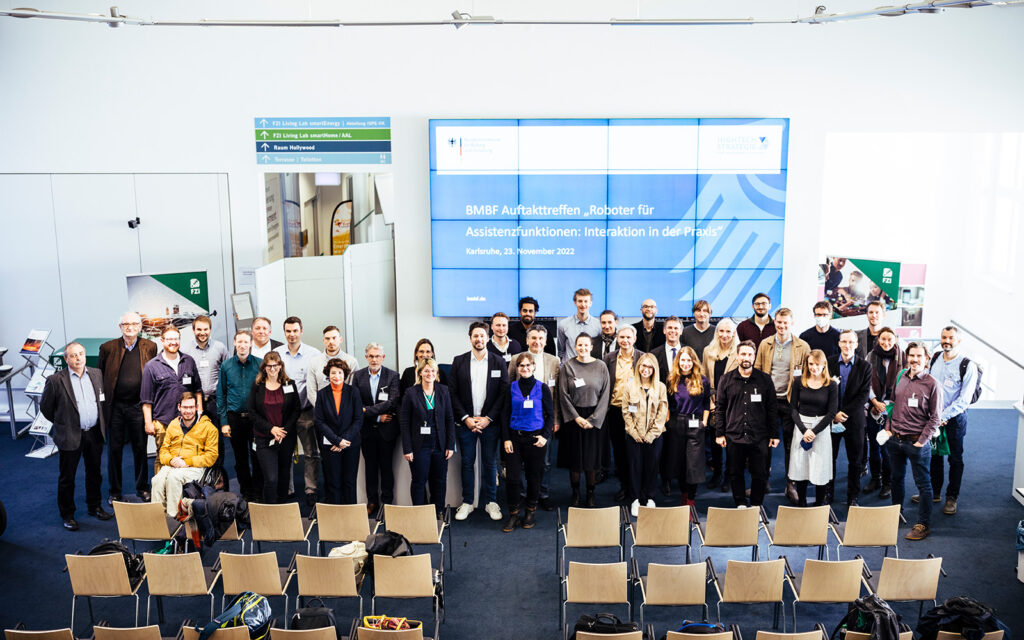FZI Live
Networking Event on Robotics in Daily Life
Networking event on BMBF announcement "Roboter für Assistenzfunktionen: Interaktion in der Praxis - Phase 2" (RA3)
The Federal Ministry of Education and Research (BMBF) invites participants to a networking meeting. On June 17, 2024, the parties involved in the funded projects of the RA3 funding line on robots in assistance functions will come together. The FZI Research Center for Information Technology, as consortium leader of the Transfer Center for Robotics in Everyday Life (RimA), organizes the meeting and will be on-site with speakers.
For the FZI, the exploration of robots for assistance functions and the interaction between humans and robots is entering the next phase: jointly with the RimA consortium, the RimA knowledge platform and the RimA community online forum will also be presented in Berlin. On top of that, there will be workshops for the RA3 competence centers ZEN-MRI, RuhrBots, and rokit.
Agenda
10:00 - 10:30 a.m.:
Registration and Welcome Coffee
10:30 - 11:00 a.m.:
Welcome by the Federal Ministry of Education and Research
Katrin Nostadt, Advisor in the division “Interaktive Technologien für Gesundheit und Lebensqualität (Interactive Technologies for Healthcare and Quality of Life)” at the Federal Ministry of Education and Research
Welcome and Update by the Transfer Center for Robotics in Everyday Life
RimA Coordinator and FZI Department Manager Tristan Schnell, M. Sc.
11:00 a.m - 1:00 p.m.:
Workshops Part I
“Wirtschaftlichkeit und Geschäftsmodellentwicklung” (60 min.)
Prof. Dr. Martin Gersch and Björn Kral, M. Sc., Freie Universität Berlin
“Risikobeurteilung eines Assistenzroboters zur Analyse nicht-akzeptabler Risiken im Rahmen der Maschinenrichtlinie” (60 min.)
Philip Saueressig, TÜV SÜD AG
1:00 - 2:00 p.m.:
Lunch Break with Networking
2:00 - 3:30 p.m.:
Workshops Part II
“Open Source Software für Roboter im Alltag” (45 min.)
Tristan Schnell, M. Sc., FZI Research Center for Information Technology
“RimA-Benchmark: Erfahrungsbericht und Ausblick auf Phase 2” (45 min.)
Prof. Dr. Sven Behnke and Dr. Raphael Memmesheimer,
Rheinische Friedrich-Wilhelms-Universität Bonn
3:30 - 4:00 p.m.:
Informationen on Benchmarking of the Competence Centers
VDI/VDE Innovation + Technik GmbH
4:00 - 4:50 p.m.:
Summary and Outlook
Transfer Center for Robotics in Everyday Life (RimA)
4:50 - 5:00 p.m.:
Farewell and Feedback
Please mind:
About the RA3 funding program
The funding measure is based on the BMBF (Federal Ministry of Education and Research) research program on human-technology interaction (MTI) “Technik zum Menschen bringen (Bringing Technology to People)” in the field “Digitale Gesellschaft (Digital Society.” The program aims to promote innovative research and development projects in human-technology interaction, to test assistance robots in practical application scenarios comprehensively, and thus to contribute to the future transfer of assistance robotics to specific fields of application.
Forward-looking solutions must consider individual interaction behavior and the environment as well as technological possibilities, and they must be measured against the social requirements for “interactive assistance robotics.” The aim is to develop flexible and efficient solutions for optimized interaction between humans and robots. The entire spectrum of human-robot interactions (MRI) will be addressed for all everyday situations.
The BMBF (Federal Ministry of Education and Research) has organized the funding priority “Robots for Assistance Functions” as a three-part series of announcements. In stage 1, the projects focussed on basic interactive skills. The second announcement in the series (RA2) focussed on “interaction strategies.” Within the frame of the third BMBF announcement, “Roboter für Assistenzfunktionen: Interaktion in der Praxis – Phase 2” (RA3), the competence centers for assistance robotics in defined application domains are now being funded for practical testing. These are the so-called RA3 competence centers rokit, RuhrBotS, ZEN MRI, and the RimA transfer center.

Date
Time
Referenten
-
Arne RönnauProfessor at Karlsruhe Institute of Technology (KIT)
His current work focuses on OpenSource Software (OSS) especially ROS (Robot Operating System), Human-Robot Collaboration (HRC), design of innovative service robotics applications.
-
Philip SaueressigTÜV SÜD AG
-
Prof. Dr. Martin GerschProfessor at the Freie Universität Berlin
-
Prof. Dr. Sven BehnkeProfessor at the Rheinische Friedrich-Wilhelms-Universität Bonn
-
Tristan SchnellDepartment Manager at the FZI Research Center for Information Technology
